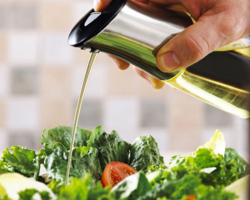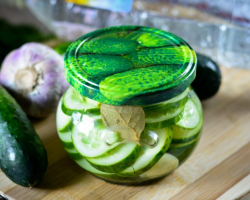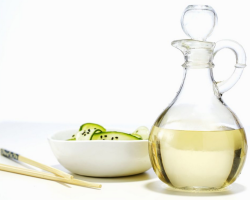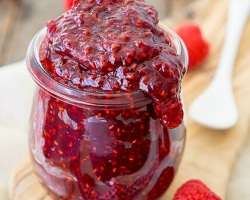It is important to be able to use proper spices and seasonings. Each dish has its spices.
Content
- What are spices?
- How do spices differ from seasonings?
- Spices for meat dishes
- Spices for salads
- Spices for fish dishes
- Spices for desserts
- How to buy, store and use spices correctly?
- Video: what spices are suitable for - the secrets of the chef e
- Video: spices - what and how to use? Review of my spices - Senya Miro
- Video: Home seasonings a little more aromatic!
Spices are, without exaggeration, a culinary phenomenon known to humanity since time immemorial. For example, references to such products that were previously used not only in cooking, but even in religious rites, can be found in the oldest annals of China and Egypt.
Read on our website another article on the topic: "Seasoning for the first and second dishes from greenery for the winter". You will find the best recipes and secrets of cooking.
In fact, it is impossible to call spices an integral part of modern cooking, however, their popularity is extremely high. It is impossible not to say that the use of spices in cooking requires certain knowledge, namely, which dishes are suitable for. It should be sorted out in this matter. Read further.
What are spices?

In modern cooking, approximately one and a half different spices are used massively, and there are hundreds of them. But what is spices and how not to get confused in their diversity?
- Spices are called different parts of plants that have a specific, persistent taste and aroma.
- Only plant additives have the right to be called. Such clarification is extremely important in the modern world where a variety of substitutes and artificially created additives are widespread.
- To create spices, a variety of plants can be used, from leaves (laurel, dill), to stems (capers, cloves) and fruits (vanilla, pepper, anise).
There is the so -called "Classification of Pokhlebkin", which divides spices into two types: exotic and local. The main difference between the types of seasonings is that exotic spices are always used dried, while local ones can be eaten both dried and fresh. In turn, local spices are also customary to divide into spicy herbs and vegetables, and the latter are divided into onion and root crops.
It is worth adding that many people identify spices with such a concept as seasoning. However, these are different terms. For example, spices should not be used separately from the dish, unlike seasonings. In addition, spices just set off the taste of dishes, while seasonings are part of the dish on their own. Read more more.
How do spices differ from seasonings?
As already written above, quite often people confuse and identify the concept of spices and seasonings, despite the fact that in fact these products are completely different. Let's see what the spices and seasonings differ in a broader sense.
- The main difference is that the seasonings are added to the dish to decorate the taste, making it more sweet, salty or spicy.
- Consequently, products such as salt, sugar, soda, citric acid, vinegar and even alcohol can be safely attributed to the category of spices.
The seasoning is a more complex definition, which can include many ingredients, including spices and any flavorings. For example, when we refuel any dish with sour cream, this product becomes a seasoning. The category of seasonings can also be attributed to such familiar products as ketchup and mayonnaise. In general, spices or spices can be considered everything that grows on trees and in the garden: leaves, roots and fruits.
It is worth noting that many spices, in addition to culinary qualities, also have healing properties. So, many herbs that we are used to see in the kitchen help to remove slag from the body and prevent the development of harmful bacteria. By the way, spices are also familiar to every person growing in the garden: garlic, onions and herbs.
Spices for meat dishes

Probably, it will not be an exaggeration to say that the most popular dishes in the world are those made of meat. This is not surprising, given that the meat does not lose its relevance either in winter or in the summer, so that it can be eaten all year round. And this means that spices for meat should be in the house constantly. What spices are best suited for meat dishes? Read more:
Beef:
- The best addition to beef is a herbal mix.
- So, for example, a juicy steak will become even more appetizing if it is tinned with a mixture of basil, turmeric, rosemary, turmeric, pepper and garlic.
Mutton:
- It goes well with dry marinade.
- Therefore, the most suitable spices for this meat are: caraway seeds, black pepper and parsley.
- It will be good to add a little citric acid to the marinade for lamb.
- Do not forget that lamb has a pronounced taste, so preparing a dish of this meat, it is very important not to overdo it with spices.
Pork:
- The most popular spices that famous cooks add to the pork are: hop-sunels, basil, garlic, caraway seeds, ginger.
- In addition, it is allowed to add exotic spices, for example, cinnamon and nutmeg.
Rabbit:
- The taste of rabbits is best shaken: sage, celery, rosemary, basil and mint.
It is worth adding that meat from meat is very universal, so that almost all existing spices can be added to them. However, as in any other business, the main thing is not to overdo it. Regardless of the meat chosen for cooking, spices need to be added to the bester and they should be used correctly, then the dish will turn out to be fragrant and tasty.
Spices for salads

Salad is a very interesting and multifaceted dish, which, among other things, needs more spices compared to other culinary creations. About which spices are best added to salads, we will tell further.
Cucumbers salads:
- This type of lettuce significantly benefits from adding spices such as fennel, fragrant pepper and estron.
- A combination with lemon, green onions, parsley, dill and thyme will also be successful.
Salads with carrots:
- For all salads that have carrots in their composition, such spices as: mint, horseradish, black pepper and parsley will be very preferable.
Salads with potatoes:
- The most suitable spices for potato salad are: thyme, paprika and oregano.
- Parsley with dill, as well as basil, celery, green onions and a popgon will not be superfluous.
Salads with red cabbage:
- This type of salad will become even tastier if you add fennel, basil, mint, ginger, celery and horseradish to it.
- In addition, you can shade the taste of the dish with cinnamon, cloves and coriander.
An important point: Add spices to the salad after mixing the ingredients. In addition, after adding spices, the salad must be allowed to stand from 10 to 15 minutes, and not immediately serve to the table.
Spices for fish dishes

It is no secret that the fish has a specific smell. Unfortunately, this feature very often becomes the reason that housewives refuse to cook fish dishes. However, this is a big mistake, because the fish smell can always be decorated with correctly selected spices. Which ones? Read more:
Fish soup:
- If a fish soup is planned for lunch, then you need to stock up before cooking such spices as: pepper, parsley, bay leaf and onions.
- In addition, the presence of red pepper, chopped garlic and nutmeg does not hurt.
Fried fish:
- Most often, when frying fish, housewives use only pepper and salt. This is understandable, because fried fish is beautiful by itself.
- However, the variety has not yet harmed a single kitchen, therefore, in addition to salt and pepper, you can decorate fried fish with cable, ground coriander, almond and nutmeg.
- It is also quite appropriate to add garlic.
It is worth noting that the most popular way of making fish is baking. Such a dish always turns out delicate and juicy. But this method of preparation requires neatly handling spices. There should not be too many of them. For example, you can add only a couple of rings of onion with lemon and this will be enough for the taste of the dish to become more pleasant and saturated.
Spices for desserts

Probably, someone may seem amazing about the fact that spices are added not only to the first and second dishes, but also to desserts. However, this is a fact. Read more:
Fruit:
- They say that the correct selection of spices for fruits is the lot of real masters. Therefore, this information will definitely be interesting to any novice cook.
- So, chopped apples need to be served with vanilla or fennel, and citrus fruits (for example, tangerine) go well with cardamom and mint.
Milk dessert:
- The most suitable spice for dairy and cheese desserts is nutmeg.
- This spice will be an excellent taste addition in milk cream, sauce or pudding.
Wine cupcake:
- Such an unusual dessert as a wine cupcake will definitely not get worse if you add a little ginger, cinnamon or nutmeg to it.
Sweet pies:
- With all types of traditional sweet pies, from apple to pumpkin, cloves are well combined.
- The charm of this spice lies in the fact that it can be added to dishes with other spices, for example, ginger, cinnamon and even nutmeg.
In fact, this is not the entire list of spices that can be added to desserts. The modern assortment of spices is very wide, and everything else is a matter of technology and a question of desire. The key to culinary success is always the presence of knowledge and a creative approach. The main thing is not to be afraid to experiment.
How to buy, store and use spices correctly?
Modern markets and shops offer customers a huge assortment of spices. But not all of what lies on the shelves can differ in freshness and comply with quality standards. Meanwhile, the quality of the goods is very important for any person. How not to be mistaken when buying and choose really good spices? Let's get acquainted with the main rules of purchase:
- The most important thing that is worth paying attention to when buying spices is smell. It is no secret that all spices have a bright and specific aroma. In the event that spices on the market are really fresh, a strong smell train should spread from the counter with them. If the aroma is mild or practically absent at all, this indicates that the goods are stale.
- The second sign indicating the freshness or stiffness of spices is appearance. Fresh spices should not lose color or be too dry. If you have any of these signs, you should refuse to buy spices.
- The third indicator that is worth paying attention to when buying spices is composition of the product. Natural spices should not contain dyes and chemical additives.
No less important than buying spices is their storage. After all, even the highest quality product has the ability to deteriorate over time, especially if you store it in improper conditions. The best place for storing spices will be glass dishes with a dense lid. In addition, there must be a container with spices in a dark place.
It is difficult to imagine a modern housewife who would not have spices in the kitchen, because cooking without them is simply unthinkable. This is a unique product that can improve and enrich the taste of almost every dish. In addition to everything, even the most scanty set of products in the preparation of the dish will be able to surprise even the most sophisticated gourmet, with skillful and correct adding spices to the dish. But do not forget that it is important to be able to buy, store and use spices correctly.
It remains to state the fact that the world of spices is fantastically huge and its full study can take years. But this knowledge in any case will be an interesting process that will allow you to endlessly experiment, and also give a lot of amazing discoveries and pleasure from its own culinary achievements. It is not for nothing that they say that cooking is also an art available to every person. There would be a desire and craving for knowledge.
Video: what spices are suitable for - the secrets of the chef e
Video: spices - what and how to use? Review of my spices - Senya Miro
Video: Home seasonings a little more aromatic!
Read on the topic:
- The benefits and harm of spices and spices for health
- Seasoning for pilaf: composition
- Spices according to the horoscope: sharp pepper, sweet vanilla
- What seasonings are put in pilaf with chicken, pork, turkey?
- The seasoning of the hop-sunels: composition, benefit and harm
- Oregano - seasoning: how does it look, where is it used?







